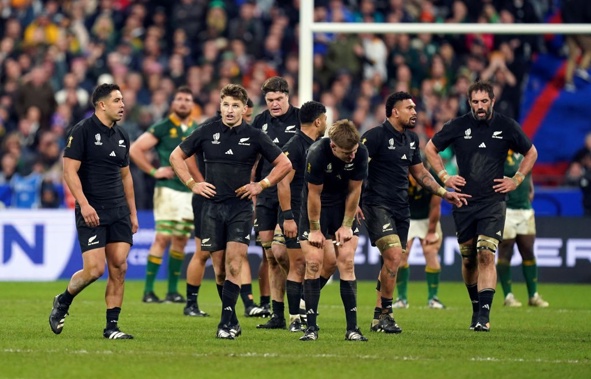
Rugby union is facing a looming crisis. The game is losing its appeal with many turning to alternative sports like basketball due to perceived complexities and a lack of engagement.
Positively, match attendance at the Rugby World Cup in France reached 1.8 million with eight knock-out matches left to be played, surpassing the 1.7 million total at the 2019 World Cup in Japan.
But the decline in players and audience numbers of non-World Cup matches cannot be denied, with the likes of New Zealand Rugby forking out $15 million for NPC operating costs and only drawing in around 200,000 in total attendance – that is not sustainable.
There has been plenty of suggestion that New Zealand has fallen out of love with rugby, one of the sticking points being how hard to understand and follow the game is.
Recognising this challenge, the Herald has explored potential changes to the laws of rugby to make the game more appealing to viewers and fans. Let us know in the comments what you think would work and any suggestions you have.
Red and yellow cards
- Implementing a system similar to the NRL where players are initially placed on report, allowing them to stay on the field while addressing potential infringements after the game.
- Teams could bring on a replacement for a yellow carded player for non-malicious/accidental head contact so the team can play on with 15.
- For head clashes only, allow the 20-minute red card advocated by the southern hemisphere (the player is sent off but the team is permitted to replace him). However, the 20-minute version is only to be used in instances where the three refs on the field feel there is some degree of mitigation, instead of a yellow card. This would have been employed in the Siya Kolisi head clash incident many Kiwis felt was just as culpable as Sam Cane’s while others felt it wasn’t as serious.
TMO and officiating
- Move the offside zone back further behind the ruck and enforce it properly to give attackers more time.
- Limit TMO intervention to only seriously reckless or cynical incidents and allow referees to make more on-field decisions.
Set piece
- At scrum time, halfbacks should be required to stay behind their own No 8′s feet. If a team has won a scrum, they should not be inconvenienced in how they choose to use the ball and would encourage better ball use.
- If a scrum goes down or the front rows pop up and the ball is at the No 8′s feet, it should not be reset with either the No 8 or halfback playing the ball.
Props should be able to put a hand on the ground to stabilise the scrum, arguably even a knee.
A shot clock for scrums and lineouts. You’ve got 20 seconds from the whistle blast to the ball going in. - In a short lineout, the defending team has to have one more player in the lineout than the attacking team. Would create an incentive for the attacking team to run a ball-carrying loose forward run outside the first five-eighths, giving an overlap advantage to the team that didn’t kick the ball into touch.
Ban the rolling maul
It’s the only time teammates are allowed to be in an offside position and run interference. Ideas for neutering the maul:
- 'Something's wrong': Former international referee reviews Rugby World Cup final TMO performance
- 'Disheartening': Change one former All Black would make to TMOs
- Watch: In defence of Wayne Barnes - what he really said to Savea
- All Blacks scoop top awards, Foster misses out
- Ban rolling mauls in the defending side’s 22m zone. That would mean more emphasis on other set moves from the lineout, more use of the backs and creativity.
- Every rolling maul would be permitted only one stoppage before the halfback has to clear the ball. If the maul keeps moving forward, fine, but as soon as it halts the ball must be cleared.
Points
Change scoring so that a penalty goal is worth only two points, forcing players to score more tries to score more points. Additionally, conversions could be increased from two points to three to further entice running rugby.
Conclusion
Many stakeholders in the rugby community share these concerns about the direction of the sport, but only with open dialogue and collaboration can these issues be addressed.
Rugby, with its rich history and traditions, has evolved over the years and it’s crucial to adapt to the changing preferences of fans and players.
Luke Kirkness is an Online Sports Editor for the NZ Herald. He previously covered consumer affairs for the Herald and was an assistant news director in the Bay of Plenty. He won Student Journalist of the Year in 2019.
Take your Radio, Podcasts and Music with you








